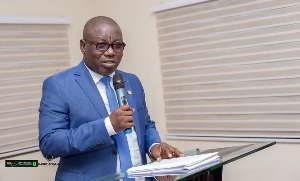Accra, June 19, GNA - Mr. Bentum K. Quantson, former Director of the Bureau of National Investigations (BNI), on Thursday urged political parties to manage their spin doctors and serial callers effectively since they were a threat to national security.
He said there was the need to identify pre-election issues so that post-election conflicts could be easily managed and stressed that the language of spin doctors and serial callers before elections were potential threat to the security of the country.
Mr. Quantson was speaking at a roundtable organized by the Friedrich Ebert Foundation, a German non-governmental organization committed to promoting good governance and democracy. Participants included members of political parties, security personnel and journalists.
He said: "If we are going to have a free and fair election politicians should caution their propagandists to avoid causing suspicion and mistrust."
He mentioned lies, intolerance and the bogus informants who criss-cross the political divide to spread false information as other sources of post-election conflicts.
Mr. Quantson also expressed concern about frequent mob action and said it was a great cause for worry and called on the security agencies to be up and doing to help curb them.
He also advised politicians to endeavour to prove that they really had the national interest at heart and said, "a politician thinks of the next election but a statesman thinks of the next generation". Mr Quantson urged Ghanaians to develop love for national interest instead of personal or party interest.
Mr. Joe Ghartey, Minister of Justice and Attorney-General, said the challenges of post-election environment went beyond the transition of an outgoing government to the government elect to include strategies to help losing parties and their numerous supporters back the government elect work towards national unity.
He said the pre-election and elections environment was as important as effectively managing post-election environment.
"Indeed conventional wisdom informs us that in zero sum games there is necessarily one winner. Yet very often parties to this game do not psyche themselves for the possibility of a loss," Mr Ghartey said. Mr David Kangah, Deputy Director at the Electoral Commission (EC) in-charge of Finance and Administration, cautioned journalists to wait for declared results by the EC before they went on air to announce winners since that also created a lot of conflicts after elections. "Journalists have no right at all to call election results; they can only give results that have been declared by the EC," he stressed. He pointed out that sometimes election officials also created problems and explained that elections officials were not fully controlled by the EC because they were part time workers for the EC. Mr. Kangah further advised politicians to report any election official whose performance only caused trouble later.
He said politicians should also familiarize themselves with the law so that if there was a case to be presented in court it would be done properly to avoid delay in judgement.
Mr. Samuel Opoku-Agyakwa, Programmes Coordinator at the Friedrich Ebert Foundation, who represented the Country Director, said post-election conflicts required varied approach to solving them and could also create a number of challenges in a country. He said the discussions sought to identify various tasks that had to be undertaken to facilitate a smooth and effective transition and draw a time table for their implementation.
General News of Thursday, 19 June 2008
Source: GNA












